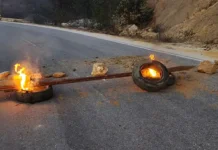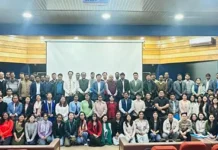[Khoda Rakhi]
Covid-19 has compelled each one of us to reflect on our life’s priorities. I have always believed that farmers and environmentalists are the true contributors to our healthy existence; hence I am always at awe whenever I get to meet and come across passionate farmers and environmentalists.
 One such person is 62-year-old Taba Taro, s/o Lt Taba Teri of Upper Jumi village in Kimin administrative jurisdiction, who is the pioneer of small tea growers in Kimin, a concept which was a brave venture.
One such person is 62-year-old Taba Taro, s/o Lt Taba Teri of Upper Jumi village in Kimin administrative jurisdiction, who is the pioneer of small tea growers in Kimin, a concept which was a brave venture.
My weekly official travels from Kimin to Kakoi by crossing Jumi amidst lush rice fields and aromatic tea garden used to be a lovely experience. During my trips, I often found Taba Taro labouring in his tea garden and fish pond premises from early morning till late in the evening. On my return trip we would either wave to each other or nod from a distance as an acknowledgement.
Amazed by his consistency to labour despite changing weather and seasons, one day, during my usual trip to Kakoi, I decided to meet him and hear about his passion for farming.
I was surprised to know that he had been an anchal samiti member and was in active politics for four tenures in the past.
He told me that those times were trying and stressful, though he got an opportunity to serve the people. When I asked him how hard it was at his age and with experience of being a prominent PRI member to break the stereotyping of a physically demanding menial job as a full-time farmer, he spoke with a wisely aged smile that it may seem like that but in the end farming gives him an inner peace and a sense of purpose which is irreplaceable.
He said that, initially he was a jhum cultivator, but in 1997 a few scientists from Kolkata, West Bengal, had come to 7th Camp in Kimin and upto Yachuli in Lower Subansiri for soil testing, during which he overheard their conversation that his jhum land had perfect PH as desired for successful tea cultivation.
Inquisitively, he gathered more information on it, and ventured out to collect tea saplings for plantation. He started with one acre of plantation with cuttings and saplings managed with much difficulty from Koilamari, Johing and Dejoo in Assam, and then increased acre by acre each year.
During his early years as a tea grower, he had to face many hurdles as the well-established tea estates had such policies which discouraged collection of leaves from private growers. However, the desperation of finding a market for tea leaves led him to join the self-help group of small tea growers of nearby Assam, with the help of which he could send his freshly plucked tea leaves along with the rest of the group members to be sold at Ananda Tea Estate in Dollungmukh, Assam.
Time management was of utmost importance, since all the group members had to pluck their leaves on the same day and send them to Dollungmukh and later at Dejoo Tea Estate where the leaves were purchased on weight. The output was low as many times the leaves got damaged during the transit and had to be disposed of.
Later, with time, some of the nearby tea estates had more flexible policies and a few reforms which encouraged purchasing from private growers, and they found a more conducive and stable market in the vicinity.
Tea plantation is a highly labour intensive sector, involving land preparation, sowing, weeding, plucking, pruning, manuring, and spraying of insecticides from time to time. Usually it takes at least five years for the plant to mature and produce a good yield, though the leaves can be plucked from the first year itself. Once grown, the plucking or the harvesting season starts from March-April and lasts upto November-December – June-August being the peak season for plucking of leaves. It has a long harvesting season of at least nine months, depending upon rain and humidity, and three months of preparatory season for pruning, manuring, weeding, land development, etc.
On an average, Taro said, the productivity of his tea garden is around 400-500 kg weekly per hectare of plantation. Productivity is maximum during the peak season. Fresh tea leaves are purchased at factories by their weight and till last year the general purchase rate was somewhere between Rs 24-26/kg.
India, being one of the largest producers and exporters of tea, has a continuous market for tea. If one is able to tap on the long harvest season with well-managed supply, it can definitely give huge returns to the farmer with a decent steady income.
The present lockdown has hit hard many small tea growers in our vicinity. A farmer knows very well that time and tide wait for none; hence, each activity in farming has to be timed perfectly. One missed activity would impact the other.
Lack of low-cost migrant labourers has created a trickling impact on productivity. Less manpower means lesser harvest and lesser returns. The lockdown has directly impacted many sectors. Even with few exemptions for limited sectors, trade is anything from becoming normal.
Tea being a cash crop is highly dependent on good market policies and trade system. While many were seeking travel permissions to visit the state capital on one pretext or the other, Taro one day turned up at my office, seeking permission for transportation of tea leaves from his garden along with the rest of the small tea growers of Kimin, which we immediately initiated with few conditions as per the prevailing SOP.
Like I said, a farmer’s calendar is perfectly timed with weather and season. His time is most valuable and his produce most holy.
Jumi Tea Estate had started with 6-7 labourers, and today it employs around 30-40 labourers along with active involvement of all their family members during the peak season. The tea plantation covers an area of 11 hectares (approximately), out of which four hectares of plantation are exclusively catering to production of green tea and has found a steady market among the locals in the vicinity. They also have a small nursery, which has started commercial supply of saplings for tea growers in a few neighbouring districts.
Along with tea plantation, Taro is involved in pisciculture, which adds to his annual income. It helps Taro provide a decent living for his family of nine children and many grandchildren. It also instills in them a sense of responsibility and pride towards the often discouraged activity of farming.
His wife, Taba Yakhi, assists him in his work while also venturing out in sericulture activities at the village level. The couple is recipients of many awards and certificates as emerging farmers and act as regular resource persons during annual training programmes that are organized departmentally.
This green passion has thankfully been passed on to his next generation and today his young son, Taba Nobin (29), a graduate in bachelor of business management from Sheshadripuram College, Bangalore, joins him full-time in his farm activities, bringing in more scientific and youthful energy in farming.
While many of our educated and unemployed youths are permanently waiting on some imaginary employment in any organized sector or opportunity to grab some petty contractual works without any particular experience or expertise, only a few understand that the intent of education is to awaken the purpose within us to be of some usefulness to the society in any capacity. The sole purpose is to be purposefully existent.
Generally in Arunachal we tend to have an obsession for regular government employment and contractual works as an easy source of income and secured life. However, Covid-19 has made us realize that farming should have been our most important and primary source of livelihood. Like Taba Taro, there are many serious farmers across Arunachal whose stories need to be heard and acknowledged as a meaningful and rewarding option of livelihood in the new generation.
Apart from the appreciation and certificates, flexible trading system, financial assistance, subsidies in procurement of farm products and machineries, aid and assistance for small infrastructure development like organic farming and vermicomposting, etc, would help these emerging farmers a lot to develop as established farmers.
The government of Arunachal has now started pulling up its socks on agriculture and allied activities, and the APMCs too have made their presence felt during the lockdown; but much is yet to be done to attract the new generation into serious farming.
Recently, the RD department came up with a challenging agri-horti cluster farming project to be implemented in all 60 assembly constituencies across the state. Though with many dilemmas in terms of execution, it is still a welcome step. As an optimistic Arunachalee, one can just hope that the pandemic has given us enough reason to understand the primary activities which are in dire need of handholding assistance through bold and innovative reforms in government policies. (Khoda Rakhi is an APCS officer, currently posted as EAC, Kimin, Papum Pare.)





